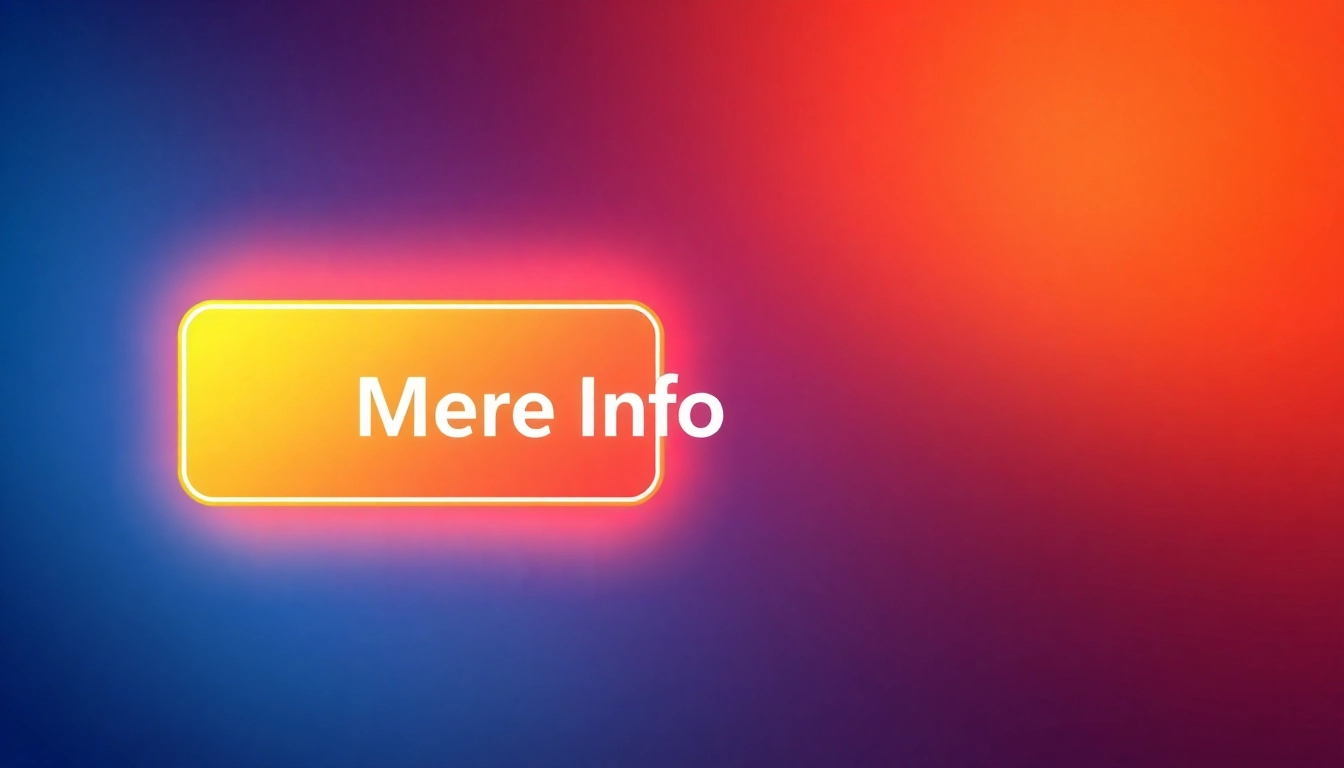Your Guide to Accessing More Info: Tips for Effective Communication

Understanding the Importance of More Info
In our increasingly complex world, the pursuit of knowledge often requires us to seek More Info. But what does it mean to seek more information? Is it inherently beneficial, or can it lead to information overload? This article delves into the nuances of accessing additional information, exploring its significance, approaches, resources, and the measurable impact of this pursuit across various contexts.
Defining ‘More Info’ in Context
The term “more info” refers to the act of acquiring additional knowledge or clarification regarding a subject, idea, or decision. In an age where information is abundant, knowing when and how to seek further information can make a critical difference. Whether one is making a purchasing decision, crafting a business strategy, or resolving a personal quandary, the concept of ‘more info’ takes on various forms, such as:
- Requesting details about a product’s specifications before a purchase.
- Seeking additional context about industry trends for informed decision-making.
- Clarifying the intent of a communication in personal or professional relationships.
Understanding the context surrounding the request for more information can help tailor the communication effectively and enhance the quality of information retrieved.
Why Accessing Further Information Matters
Accessing further information serves multiple vital purposes:
- Informed Decision-Making: Gathering comprehensive data allows individuals and organizations to make decisions based on facts rather than assumptions.
- Risk Mitigation: Knowledge equips us to identify potential pitfalls and avoid missteps.
- Enhanced Learning: Engaging with more information fosters a culture of curiosity and continuous learning.
- Empowerment: Reliable information empowers individuals to advocate for themselves, whether in negotiations, health choices, or consumer rights.
Common Scenarios Requiring More Info
Many everyday situations necessitate the need for more information:
- Shopping and Consumer Choices: Customers frequently seek additional details about products to ensure they meet their needs.
- Healthcare Decisions: Patients often look for more information regarding treatments and medications to make informed health decisions.
- Career Development: Professionals may seek information related to skills and industry trends to enhance their career prospects.
- Business Development: Entrepreneurs might search for market data before launching new products or services.
Best Practices for Seeking More Info
Finding and accessing more information efficiently requires a thoughtful approach. Here are key best practices to consider:
Effective Communication Strategies
Effective communication is critical when seeking additional information. The following strategies can help:
- Be Specific: Clearly define what information you need. A specific query is more likely to yield relevant responses.
- Use the Right Channels: Tailor your approach based on the medium, whether verbal, digital, or written.
- Build Rapport: Establish a connection with the person or source you are querying to encourage cooperation and willingness to share information.
Utilizing Digital Platforms for Queries
Digital platforms provide diverse avenues for obtaining more information. Examples include:
- Search Engines: Utilizing well-structured queries can yield useful results. Online databases and archives can be excellent sources of detailed information.
- Social Media: Leveraging platforms like Twitter or LinkedIn to engage in conversations with experts can provide valuable insights.
- Online Forums: Communities and forums allow people to join discussions around particular interests or problems, encouraging knowledge sharing.
How to Frame Your Questions for Clarity
Framing effective questions is essential for obtaining the right information. Consider these guidelines:
- Focus on Open-Ended Questions: These encourage elaboration from the respondent and often yield richer responses.
- Break Down Complex Queries: If you have a multifaceted question, tackle it in smaller, simpler parts.
- Acknowledge Context: Providing context helps the recipient understand the purpose behind your inquiry, leading to more tailored and informed responses.
Resources for Finding More Info
To support your quest for more information, various resources can be leveraged:
Reliable Online Platforms for Information
Several online platforms are excellent sources for credible information:
- Educational Institutions: Websites like Harvard Business School Online provide comprehensive courses and information delivered by reputable experts.
- Industry Publications: Articles and reports from industry leaders often provide up-to-date information and trends.
- Government Resources: Government websites can be reliable sources for statistics and legislation that can inform research or decisions.
Contacting Experts for In-Depth Guidance
Sometimes, the best way to seek more info is to reach out directly to experts in the field. Consider:
- Networking: Attend industry conferences, seminars, or workshops to connect with knowledgeable individuals.
- LinkedIn: Use connections or join groups where professionals share insights and information.
- Email Outreach: Crafting a concise email to an expert can oftentimes yield surprising and generous responses.
Using Search Engines Effectively
Mastering certain search engine strategies can dramatically improve the quality of information retrieved:
- Utilize Advanced Search Operators: Techniques such as quotation marks for exact phrases and the minus sign to exclude terms can refine results.
- Evaluate Credibility: Checking the source and its expertise is vital. Preference should go to reputable and recognized authors or organizations.
- Organize Results: Bookmark relevant findings and label them for future reference to avoid having to sift through results repeatedly.
Examples of Successful ‘More Info’ Usage
The practical application of seeking more information often leads to success stories across various industries. Here are a few noteworthy examples:
Case Studies from Various Industries
Consider the case of a tech company that significantly improved its product development process by implementing a customer feedback loop. By actively seeking more info through surveys and interviews, they were able to iterate their product to better meet user needs. This not only enhanced customer satisfaction but also led to a notable increase in sales.
Customer Service Success Stories
One prominent retail chain adopted a new approach to customer service by integrating a robust information-seeking strategy. Customer service representatives were trained to ask specific questions when resolving complaints. As a result, they were able to provide more effective resolutions, thereby increasing customer loyalty and retention rates.
Innovative Uses in Marketing
Marketers who leverage more information about consumer behavior can craft highly personalized campaigns. For instance, a beauty brand utilized analytics to track customer preferences and shopping habits. The targeted campaigns that arose from this data analysis resulted in increased engagement and conversion rates, illustrating the power of seeking additional information in marketing strategies.
Measuring the Impact of More Info Access
Accessing more information can be transformative, but understanding its impact is essential for continuous improvement. Here are paths to effectively measure this impact:
Key Metrics to Evaluate Effectiveness
Organizations can track several metrics to measure the effectiveness of their information-seeking efforts:
- Customer Satisfaction Scores: Regular surveys can gauge how well customer inquiries are answered, reflecting the organization’s efficiency in delivering information.
- Employee Productivity Metrics: Tracking time spent on seeking information versus executing tasks may highlight efficiency improvements stemming from better access to information.
- Sales Conversions: Analyzing conversion rates following targeted information outreach can establish a connection between data-driven engagement and sales performance.
Analyzing User Engagement and Satisfaction
The effectiveness of information access can also be examined through user engagement metrics:
- Engagement Rate: Understanding how users interact with the information provided can inform improvements in content delivery.
- Net Promoter Score (NPS): A strong NPS indicates that users find the information valuable and are likely to recommend your services or products to others.
- Feedback Mechanisms: Constructing avenues where audiences can provide feedback on the information they received can highlight areas for improvement.
Improving Processes Based on Feedback
Finally, the evaluation of how effectively users access information should lead to actionable improvements:
- Iterative Improvements: Organizations can refine their information dissemination processes based on direct user feedback.
- Training Programs: Continued education for staff on how to better seek and provide information can help sustain high standards of service.
- Technology Upgrades: Implementing new technology solutions that facilitate better communication and information retrieval can provide long-term benefits.
Conclusion
In a world where data is abundant and often overwhelming, distinguishing between the requisite information and noise becomes vital. Understanding the importance of seeking more info, employing best practices, leveraging resources, analyzing successful usage, and measuring impact are all critical components that pave the way for informed decisions and enhanced understanding. By cultivating effective communication strategies and utilizing the right tools, individuals and organizations alike can navigate the information-laden landscape with confidence and clarity.







